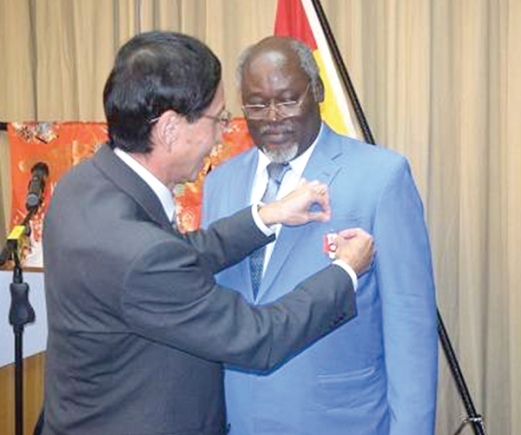
Japan honours Prof. Anang with Order of the Rising Sun
The honour of the Order of the Rising Sun, Gold Rays with Rosétte has been conferred on the former Director of the Noguchi Memorial Institute for Medical Research (NMIMR), Professor Abraham Kwabena Anang.
The conferment, delivered on behalf of His Majesty the Emperor of Japan by the Japanese Ambassador to Ghana, Mochizuki Hisanobu, was in honour of Professor Anang’s devotion to the development of the NMIMR and his distinguished contribution to the promotion of mutual understanding between Japan and Ghana.
Order of the Rising Sun
Decorating the renowned Professor with the colourful badge, the Ambassador said the Order of the Rising Sun, “Kyokujitsu sho”, is a Japanese award first established in 1875 by Emperor Meiji, featuring rays of sunlight radiating from the rising sun. This honour has been given to non-Japanese recipients since in 1981.
“These rays represent the vigorous momentum reaching higher to the sky or heavens. This prestigious award is now presented to both Japanese and Foreign Nationals who have rendered distinguished services to the state in various fields”.
“Tonight, the Order of the Rising Sun, Gold Rays with Rosette, will be given to a remarkable Ghanaian, Professor Anang, who has dedicated his life, for over four decades of service, to the Noguchi Memorial Institute for Medical Research,” he said.
Significant research
According to the Ambassador, young Professor Anang started engaging in research in the institute since 1985, and served as its director from 2017 until his retirement in 2021. As a prominent researcher, he initiated and conducted significant research, as well as promoted mutual understanding between Japan and Ghana over a long period of nearly 40 years.
He consistently devoted himself to the development of the Noguchi Memorial Institute for Medical Research (NMIMR) and owing to his leadership and with support from his colleagues, the Noguchi Memorial Institute for Medical Research is now widely known as the successful example symbolizing the relationship between Ghana and Japan.
The Japanese Ambassador expressed his appreciation to researchers both home and abroad who have worked tirelessly to promote the institute to its current status and was honoured to be the one to have decorated the seasoned Professor with the colourful badge.
Global Partnerships
For his part, Professor Anang stressed on the importance of global partnerships to tackle unforeseen circumstances like the COVID-19 Pandemic and stated that the Noguchi Institute became the leading research reference centre in Ghana and even in the Sub Region.
He appreciated the efforts of both the Ghanaian and Japanese team that made the establishment of the NMIMR possible, and the visions of Dr Hideyo Noguchi for his dedication and commitment, not only to Ghana, but the world at large.
“I couldn’t have been involved to get the Order of the Rising Sun, Golden Rays with Rosette, if not for these incredible people that paved the way for me to contribute my quota in the field,” he added.
Government of Japan
Professor Anang was very appreciative to the Emperor of Japan, through the Japanese Ambassador to Ghana, and thanked the Government of Japan “for this friendship and cooperation into making this occasion a success”.
The Noguchi Institute receives specimens from Ghana and other West African countries in cases of outbreaks of infectious diseases in the Region. During the outbreak of COVID-19, Noguchi Memorial Institute for Medical Research conducted up to 80 per cent of PCR tests and significantly contributed to tackling the pandemic, largely under the insightful leadership of Prof. Abraham Anang.
Development of the institute
“We all acknowledge his unwavering commitment to research, exemplary leadership and tireless efforts in the development of the institute. Owing to his leadership and with support from his colleagues, the NMIMR is now widely known as the successful example symbolising the relationship between Japan and Ghana,” he added.
The Noguchi Memorial Institute for Medical Research (NMIMR) was set up in 1979 as a semi-autonomous institute of the University of Ghana, and is currently the leading biomedical research facility in Ghana. The institute is the result of joint efforts by Prof. E. O. Easmon, former Dean of the University of Ghana Medical School; Prof. Kenji Honda of Fukushima Medical School in Japan and the Japan International Co-operation Agency (JICA).
It was built by the Government of Japan and donated to the Government and people of Ghana in honour of the distinguished Japanese researcher Dr. Hideyo Noguchi, who researched into yellow fever in Ghana and died from the disease in 1928.
Vision and Mission
The vision of the institute is to be a leading global medical research centre, with mission of improving the health and well-being of Ghanaians and mankind through focused and relevant quality biomedical research, human resource development and support of national public health activities.
The overall mandate of the Institute is to conduct research into diseases of public health importance, train postgraduate students in biomedical sciences and support the public health programmes of the Ministry of Health and Ghana Health Service. Specifically this involved Conducting research into communicable and non-communicable diseases; Providing training opportunities in biomedical research for undergraduate and postgraduate students; Providing high-end laboratory diagnostic and monitoring and surveillance services in support of national public health.
